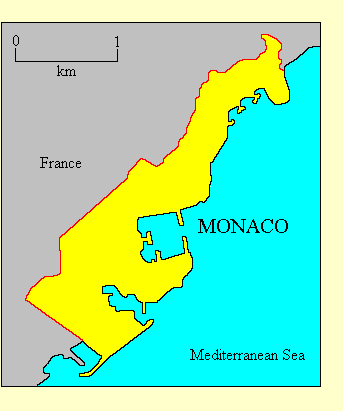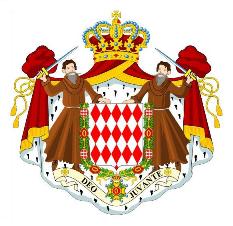

PRINCIPALITY OF MONACO
Official name: Principaute de Monaco (Principality of Monaco)
Location: Western Europe
International organisations: Council of Europe, Organisation for Security and Co-operation in
Europe, United Nations
Borders: France
Coastline: Mediterranean Sea
Land area: 2 Km2
Population: 33,000. Only about 6,000 of these are Monegasque citizens. The rest are resident foreigners, the
large majority French or Italian.
Annual GDP (PPP) per capita: US$30,000 (2009 CIA estimate). World ranking: 32
Ethnicity: Most of the population is mixed French and Italian descent.
Languages: French is the official language and generally used. English and Italian are widely understood.
Religion: About 90% of the population are Catholic Christians. There is a 5% Jewish minority.
Form of government: Constitutional monarchy and parliamentary democracy.
Capital: Monaco
Constitution: The
Constitution of Monaco came into effect on 17 December 1962.
Head of state: Prince Albert II
came to the throne on 6 April 2005.
Head of government: The Minister of State, appointed by the Prince in consultation with the French Government. The Prince appoints other members of the Cabinet.
Legislature: Monaco has a unicameral legislature, the
National Council (Conseil National), which has 24 members elected
for five-year terms, 16 members by list majority system, and eight by proportional representation.
Electoral authority: Elections Monaco administers national
elections.
Freedom House 2009 rating: Political Rights 2, Civil Liberties 1

Political history
Monaco was established as a dependency of Genoa in 1215, and has been ruled by the
Grimaldi family since 1297. It has been recognised as a principality since 1612. It was annexed by
revolutionary France in 1793, and in 1815 was made a dependency of the Kingdom of Sardinia. In 1860, when
Sardinia became the Kingdom of Italy, France refused to allow Monaco to pass under Italian control, and by the
Franco-Monegasque Treaty of 1891 it became a semi-independent principality under French protection. The Princes ruled
as absolute monarchs until 1911, when a system of limited constitutional government
was established. A constitution was promulgated in 1962, giving women the vote and establishing a formal
Monegasque citizenship.
Monaco is not a fully sovereign state. Under the terms of the treaty, France has control over Monaco's defence and
foreign policy. Nor is it fully democratic, because the Minister of State is not a member of the National Council and
does not need its support to hold office. The Minister of State is appointed by the Prince with the approval of the
French Government and is a French citizen. The dominant party in the National Council is the conservative
Union for Monaco (UPM), which at the 2008 election won 21 of 24 seats. The main opposition party is
the Rally and Issues for Monaco (REM). Jean-Paul Proust was Minister of State from 2005 until his resignation for
health reasons in March 2010. His successor is Michel Roger, a
French civil servant.
Freedom House's 2009
report on Monaco
says: "Monaco is an electoral democracy. However, the prince, who serves as head of state, has the sole authority to
initiate legislation and change the government... Of the estimated 33,000 residents in the principality, only
about 6,000 are actual Monegasques, who alone may participate in the election of the Conseil National... Because of a
lack of available financial information, the country's
level of corruption is difficult to measure. Monaco was not ranked by Transparency International in its 2008 Corruption
Perceptions Index... The media in Monaco are free and independent... The constitution provides for freedom of assembly,
which is generally respected by the authorities... The legal rights to a fair public trial and an independent judiciary
are generally respected.
Updated April 2010
|

